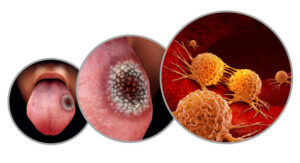 Did you know that 1 person every 24 hours succumbs to oral cancer? 54,000 new cases of oral cancer are diagnosed annually. Although it is treatable, most people aren’t diagnosed until it has metastasized. As a result, 43% of individuals will not survive more than 5 years. The high morbidity rate is attributed to late detection. April is Oral Cancer Awareness Month, dedicated to raising awareness of the importance of regular screenings. You don’t have to be a smoker to be at risk. Here’s why you should have an oral cancer screening at least once a year.
Did you know that 1 person every 24 hours succumbs to oral cancer? 54,000 new cases of oral cancer are diagnosed annually. Although it is treatable, most people aren’t diagnosed until it has metastasized. As a result, 43% of individuals will not survive more than 5 years. The high morbidity rate is attributed to late detection. April is Oral Cancer Awareness Month, dedicated to raising awareness of the importance of regular screenings. You don’t have to be a smoker to be at risk. Here’s why you should have an oral cancer screening at least once a year.
Oral Cancer Risk Factors
Anyone can develop oral cancer, but there are several known risk factors, like smoking and heavy alcohol consumption. Human papillomavirus (HPV) is also linked to an increased risk of oral cancer. Although 99% of people clear the infection, 1% of cases can remain dormant for several years, eventually resulting in oral cancer. While smoking, alcohol, and HPV can raise the odds, 10% of cases don’t have any risk factors.
Benefits of Oral Cancer Screenings
Researchers estimate that 80% of new oral cancer cases can be diagnosed early during routine appointments for a cleaning and checkup. Your dentist is an expert in oral anatomy and can detect any abnormalities quickly. Early detection and treatment stop the cancer from spreading, decreasing the risk of mortality or serious disfigurement.
Signs and Symptoms of Oral Cancer
Symptoms of early oral cancer can be subtle and difficult to detect. Common signs can include:
- Oral sores or ulcers that don’t heal within 2 weeks.
- Red, white, or black tissue discoloration.
- Tissue that bleeds easily.
- A lump or hard spot in the tissue.
- Raised tissue or growths.
- Thickening of the tissues in the mouth.
- Firm, fixated lumps.
- Hoarseness or sore throat that doesn’t improve.
- Swollen tonsil on one side.
- Persistent cough.
- Difficult swallowing.
- A sensation of something being caught in the throat.
- Earache on one side.
Reduce Your Risk of Oral Cancer
Oral cancer doesn’t discriminate based on age or gender. Although it can affect anyone, you can take several steps to lower your risk, like:
- Don’t smoke or use tobacco.
- Moderate your alcohol consumption.
- Get the HPV vaccine.
Commit to visiting your dentist every 6 months for a cleaning and checkup, as recommended by the American Dental Association. Besides keeping your teeth and gums healthy, your dentist will also monitor your oral health to check for anything concerning. You can rest easy, knowing you’ll benefit from early detection, if the worst should happen.
About Dr. Ronald D’Andrea
Dr. D’Andrea earned his dental degree from the University of Connecticut School of Dental Medicine and has continued his education in various specialties. He focuses on prevention to support the mouth and body connection. Dr. D’Andrea is affiliated with many professional organizations, including the American Dental Association. Request an appointment online or call his office at (203) 697-8558 to schedule an oral cancer screening.






